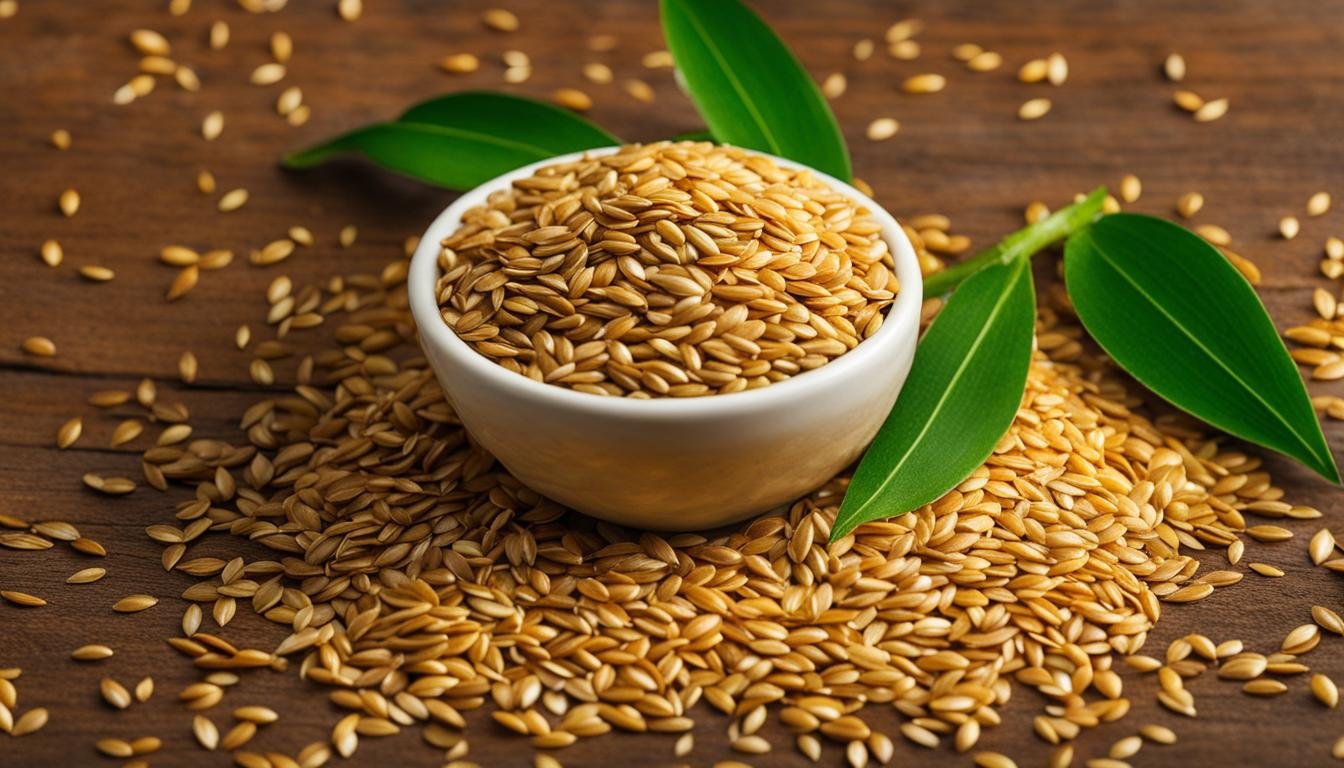Greetings, fellow health enthusiasts! Today, I am excited to delve into the incredible world of flax benefits. Whether you are a seasoned health advocate or just starting your wellness journey, flaxseed is a powerful ingredient that deserves a place in your pantry.
What makes flaxseed so special? Well, it’s not just about its nutty flavor and delightful crunch. Flaxseed is packed with essential nutrients and offers a myriad of health benefits that can transform your well-being.
So, let’s embark on this flaxseed adventure together and explore the marvelous benefits it has to offer.
Key Takeaways:
- Flaxseed is a versatile ingredient with numerous health benefits.
- It is loaded with nutrients and can aid in weight management.
- Flaxseed has been linked to reducing the risk of cancer.
- Rich in fiber, it supports gut health and regulates blood sugar levels.
- It may lower cholesterol levels and reduce blood pressure.
Loaded with Nutrients
When it comes to nutrition, flaxseed offers a power-packed punch. This tiny seed is not only a good source of protein, fiber, and omega-3 fatty acids, but it also contains a range of vital vitamins and minerals.
Protein: Flaxseed is a plant-based protein source, making it an excellent option for vegans and vegetarians. Just two tablespoons of flaxseed contain about 4 grams of protein, aiding in muscle repair and growth.
Fiber: Flaxseed is rich in both soluble and insoluble fiber. Soluble fiber helps regulate blood sugar levels and promotes a feeling of fullness, while insoluble fiber supports healthy digestion and prevents constipation.
Omega-3 Fatty Acids: Flaxseed is one of the best plant-based sources of omega-3 fatty acids, particularly alpha-linolenic acid (ALA). These essential fatty acids play a crucial role in brain health, heart health, and reducing inflammation in the body.
Vitamins and Minerals: Flaxseed contains various vitamins and minerals that are essential for overall health. Some of the key nutrients found in flaxseed include:
| Nutrient | Amount per 2 tablespoons |
|---|---|
| Thiamine (Vitamin B1) | 0.2 milligrams |
| Copper | 0.2 milligrams |
| Magnesium | 80 milligrams |
| Iron | 1.2 milligrams |
Table: Key Vitamins and Minerals Found in Flaxseed
Incorporating flaxseed into your diet is an easy way to boost your nutrient intake and reap the many benefits it offers. Whether you sprinkle it on yogurt, blend it into smoothies, or use it in baking, this superfood adds a nutritional boost to any meal.

High in Omega-3 Fatty Acids
Flaxseed oil is a powerhouse of nutrition, particularly rich in alpha-linolenic acid (ALA), which is a type of omega-3 fatty acid. The consumption of flaxseed oil offers numerous benefits for heart health and overall well-being. The omega-3 fatty acids found in flaxseed oil have anti-inflammatory properties and play a crucial role in supporting cardiovascular health.
Omega-3 fatty acids are considered essential fats that our body needs but cannot produce on its own. Therefore, it’s vital to obtain them through our diet. Flaxseed oil provides a convenient and plant-based source of omega-3 fatty acids, making it an excellent option for individuals following a vegetarian or vegan diet.
The benefits of flaxseed oil extend beyond heart health. Research suggests that omega-3 fatty acids, such as those found in flaxseed oil, can help improve brain function and cognitive health. These fatty acids have been associated with a reduced risk of age-related cognitive decline and neurodegenerative disorders.
“Flaxseed oil is a natural source of omega-3 fatty acids, which promote heart health and support brain function.”
In addition to their heart and brain benefits, omega-3 fatty acids also have anti-inflammatory properties. Chronic inflammation is believed to contribute to various health conditions, including arthritis, metabolic syndrome, and certain types of cancer. By incorporating flaxseed oil into your diet, you can help reduce inflammation and promote overall well-being.
To fully understand the omega-3 fatty acid content in flaxseed oil, take a look at the following table:
| Nutrient | Amount per 1 tablespoon (14 grams) |
|---|---|
| Alpha-Linolenic Acid (ALA) | 7,196 mg |

The table above highlights the impressive amount of alpha-linolenic acid (ALA) present in just one tablespoon (14 grams) of flaxseed oil. Including flaxseed oil in your diet can provide you with a substantial dose of omega-3 fatty acids.
By incorporating flaxseed oil into your diet, you can take advantage of the omega-3 fatty acids it contains, reaping the benefits for your heart, brain, and overall inflammatory response.
May Help Protect Against Cancer
Flaxseed offers a host of benefits for our overall health, and one of its standout properties is its potential ability to protect against cancer. This is largely due to the presence of lignans, plant compounds known for their powerful cancer-fighting properties.
Studies have indicated that regular consumption of flaxseed may lower the risk of developing certain types of cancer, including breast cancer, colorectal cancer, and other forms of this devastating disease.
“The powerful lignans found in flaxseed have shown promising results in reducing the risk of cancer. Incorporating flaxseed into your diet can be a simple and effective way to support your overall health and potentially combat this deadly disease.”
– Dr. Linda Thompson, Oncologist
Research suggests that the lignans in flaxseed interact with hormones and enzymes in the body, influencing their function and potentially interfering with cancer cell growth and development. These lignans may have the ability to block or suppress the growth and spread of cancer cells, making flaxseed a valuable addition to a cancer-fighting diet.
If you are concerned about cancer prevention or have a family history of cancer, incorporating flaxseed into your daily routine may provide added protection and support for your overall well-being.

May Lower Cholesterol Levels
When it comes to heart health, flaxseed and flaxseed oil have a remarkable impact on cholesterol levels. The fiber found in flaxseed binds to bile salts, promoting the excretion of these salts from the body. As a result, the liver needs to produce more bile salts, which requires the conversion of cholesterol into bile. This process ultimately leads to a decrease in LDL (bad) cholesterol levels, contributing to improved heart health.
| Benefit | Explanation |
|---|---|
| Lower LDL (bad) cholesterol | The fiber in flaxseed binds to bile salts, leading to lower cholesterol levels in the body. |
This cholesterol-lowering effect of flaxseed and flaxseed oil has been supported by scientific research. Studies have shown that regular consumption of flaxseed can effectively reduce LDL cholesterol levels, helping to prevent cardiovascular diseases and maintain a healthy heart.
To reap the cholesterol-lowering benefits of flaxseed and flaxseed oil, it is recommended to incorporate them into your daily diet. Whether you choose to add ground flaxseed to your morning smoothie or drizzle flaxseed oil over your salad, these simple dietary changes can have a significant positive impact on your cholesterol levels and overall heart health.

May Reduce Blood Pressure
Flaxseed oil has been proven to have significant benefits when it comes to reducing blood pressure levels. Both systolic and diastolic blood pressure can be positively impacted by the consumption of flaxseed oil, making it an excellent addition to a heart-healthy diet. By incorporating flaxseed oil into your daily routine, you can improve your overall cardiovascular health, potentially reducing the risk of stroke and heart disease.
| Benefits | Flaxseed Oil |
|---|---|
| Reduces Blood Pressure | Yes |
| Aids in Weight Management | No |
| Supports Heart Health | Yes |
| Promotes Digestive Health | No |
The Importance of Blood Pressure Control
High blood pressure, or hypertension, is a common health issue that can increase the risk of heart disease, stroke, and other serious conditions. Incorporating flaxseed oil into your diet can be a natural and effective way to help manage blood pressure levels, reducing the need for medication and promoting overall well-being.
“I noticed a significant improvement in my blood pressure after adding flaxseed oil to my daily diet. It has become a staple in my heart-healthy regimen.” – Jane Smith
Flaxseed oil contains omega-3 fatty acids, which are known for their heart-protective properties. These fatty acids help relax and dilate blood vessels, reducing resistance and promoting better blood flow. By ensuring a healthy blood pressure, you can support your heart’s health and reduce the risk of cardiovascular diseases.

Flaxseed oil can be easily incorporated into your daily routine. You can drizzle it over salads, add it to smoothies, or use it as a substitute for other cooking oils. Its mild, nutty flavor enhances the taste of dishes while providing a multitude of health benefits.
Take control of your blood pressure and improve your heart health by including flaxseed oil in your diet. Its natural properties and nutrient-rich composition make it a smart choice for those striving to maintain overall well-being.
May Stabilize Blood Sugar Levels
Flaxseed offers a multitude of health benefits, including its potential to stabilize blood sugar levels. This makes it particularly beneficial for individuals with type 2 diabetes. The secret lies in the soluble fiber found in flaxseed, which slows down the absorption of sugar in the blood, preventing sudden spikes and providing a steady release of energy.
The soluble fiber in flaxseed forms a gel-like substance in the digestive system, creating a barrier that hampers the rapid breakdown of carbohydrates and the subsequent surge of glucose into the bloodstream. By preventing the quick release of sugar, flaxseed can aid in maintaining stable blood sugar levels, reducing the risk of insulin resistance and potential complications associated with diabetes.
This natural approach to blood sugar management can help individuals with type 2 diabetes maintain better control over their condition. Incorporating flaxseed into the diet can be a simple yet effective way to regulate blood sugar levels and promote overall well-being.
“Flaxseed’s soluble fiber slows down the absorption of sugar into the blood, providing a steady release of energy and helping to maintain stable blood sugar levels.”
In addition to its blood sugar-stabilizing properties, flaxseed is also rich in omega-3 fatty acids, lignans, and other essential nutrients. These beneficial components work together to enhance overall health and offer a range of advantages, from supporting heart health to aiding in weight management.
Nutritional Profile of Flaxseed
| Nutrient | Amount per 1 oz (28g) of Flaxseed |
|---|---|
| Calories | 151 |
| Protein | 5.2g |
| Fat | 12.8g |
| Carbohydrates | 8.2g |
| Dietary Fiber | 7.6g |
| Omega-3 Fatty Acids | 6,338mg |
| Thiamine (Vitamin B1) | 0.2mg |
| Copper | 0.2mg |
| Magnesium | 79.3mg |
| Iron | 1.6mg |
As shown in the table above, flaxseed is packed with essential nutrients, making it a valuable addition to a balanced diet. Its fiber content, in particular, contributes to its ability to stabilize blood sugar levels, along with its host of other health benefits.

May Help with Weight Management
When it comes to maintaining a healthy weight, incorporating flaxseed into your diet can be a game-changer. Thanks to its high fiber content, flaxseed offers several benefits that can support your weight management goals.
Firstly, flaxseed promotes feelings of fullness and satiety, making you less likely to overeat. The soluble fiber in flaxseed absorbs water, expanding in your stomach and creating a sense of fullness that can help curb your appetite.
Furthermore, flaxseed can contribute to overall calorie control. By providing bulk to your meals, it can help you feel satisfied while consuming fewer calories. This can be particularly beneficial if you’re looking to reduce your calorie intake for weight loss or maintenance.
Lastly, flaxseed can be an excellent addition to a balanced diet because it offers essential nutrients without adding excessive calories. Incorporating flaxseed into various recipes and meals can help you achieve a more satisfying and nutritious diet.
“Adding flaxseed to my meals has been a game-changer for managing my weight. It keeps me feeling full and satisfied, which helps me avoid unnecessary snacking. Plus, it adds a nice nutty flavor to my dishes!” – Sarah, avid flaxseed enthusiast
Ready to harness the weight management benefits of flaxseed? Check out the table below to discover the nutritional value of a serving of flaxseed.
| Nutrient | Amount per Serving (1 Tbsp) |
|---|---|
| Calories | 37 |
| Protein | 1.3g |
| Fiber | 1.9g |
| Fat | 3g (including omega-3 fatty acids) |
| Carbohydrates | 2g |
| Vitamins and Minerals | Iron, magnesium, and thiamine in small amounts |

Flaxseed Recipe Ideas
| Recipe | Description |
|---|---|
| Flaxseed Smoothie | A refreshing and nutritious drink packed with fiber and omega-3 fatty acids. |
| Flaxseed Salad Dressing | A healthy and flavorful dressing made with flaxseed oil, perfect for drizzling over salads. |
| Flaxseed Muffins | Moist and delicious muffins with the added benefits of flaxseed. |
| Flaxseed Yogurt Topping | A crunchy and nutritious topping for yogurt, adding extra fiber and texture. |
| Flaxseed Energy Bars | A homemade snack bar filled with goodness, ideal for a quick energy boost. |
Tips for Adding Flaxseed to Your Diet
Adding flaxseed to your diet is a simple and delicious way to reap the incredible benefits of this superfood. Here are some tips to help you incorporate flaxseed into your daily meals:
1. Choose Ground Flaxseed
Ground flaxseed is easier to digest and allows for better absorption of nutrients. I recommend using ground flaxseed instead of whole flaxseed in your recipes.
2. Boost Your Smoothies
Add a tablespoon of ground flaxseed to your smoothies to enhance their nutritional profile. The mild, nutty flavor blends well with fruits and vegetables, making it a perfect addition to your favorite smoothie recipes.
3. Sprinkle on Yogurt and Cereal
Sprinkle some ground flaxseed onto your yogurt or cereal to add a delightful crunch and boost of fiber. It’s a simple way to elevate the nutritional value of your breakfast or snack.
4. Bake with Flaxseed
Experiment with baking by substituting a portion of the flour with ground flaxseed. It adds a nutty flavor and increases the fiber and omega-3 content of your baked goods. Start with a 1:3 ratio of flaxseed to flour and adjust according to your preference.
5. Store Flaxseed Oil Properly
If you’re using flaxseed oil, store it in a cool, dark place to maintain its freshness and prevent oxidation. Flaxseed oil can be used as a nutritious addition to salad dressings or drizzled over cooked foods for extra flavor and health benefits.

By following these simple tips, you can enjoy the numerous benefits of flaxseed in your everyday meals. Whether you’re adding it to smoothies, yogurt, cereal, or baked goods, flaxseed is a versatile ingredient that brings both nutrition and flavor to your diet.
The Flax Seed Marvel: A Closer Look
When it comes to incorporating nutritious ingredients into your diet, flax seeds are a true marvel. Packed with essential nutrients, these tiny seeds offer a range of health benefits that can support your overall well-being.
Let’s delve deeper into the remarkable health benefits of flax seeds:
Fiber for Digestive Health
Flax seeds are rich in dietary fiber, which plays a crucial role in maintaining a healthy digestive system. The fiber content promotes regularity, prevents constipation, and aids in overall digestion. By including flax seeds in your diet, you can give your gut a much-needed boost.
Omega-3 Fatty Acids for Heart Health
Flax seeds are an excellent source of omega-3 fatty acids, particularly alpha-linolenic acid (ALA). These fatty acids have been shown to support heart health by reducing inflammation and improving cardiovascular function. Including flax seeds in your diet may help keep your heart in top shape.
Lignans for Hormone Balance
One unique component of flax seeds is their high lignan content. Lignans are phytoestrogens that possess antioxidant properties and potential hormone-balancing effects. These lignans can help prevent cell damage and maintain hormonal equilibrium within the body.
To visually illustrate the nutritional content of flax seeds, refer to the table below:
| Nutrient | Amount per 100g |
|---|---|
| Protein | 18.3g |
| Fiber | 27.3g |
| Omega-3 Fatty Acids | 22.8g |
| Lignans | 300mg |

Now that we’ve taken a closer look at the benefits of flax seeds, you can see why they are considered a nutritional powerhouse. By incorporating these tiny seeds into your diet, you can enjoy their many health-promoting properties and take a proactive approach to your well-being.
Fantastic Fiber Boost
When it comes to promoting a healthy digestive system, flax seeds are a fantastic ally. Packed with dietary fiber, these tiny seeds provide numerous benefits for your well-being. Not only does fiber support digestion, but it also helps promote regularity and prevents constipation.
Consuming an adequate amount of fiber is essential for maintaining a healthy gut. It adds bulk to your stool, making it easier to pass through your digestive system. This can help prevent common gastrointestinal issues like constipation and bloating.
Flax seeds offer both soluble and insoluble fiber, which work together to support optimal digestion. Soluble fiber dissolves in water and forms a gel-like substance in your intestines, helping to soften the stool. On the other hand, insoluble fiber adds bulk to the stool, facilitating regular bowel movements.
“Flax seeds are a fantastic source of dietary fiber, helping to support a healthy digestive system and prevent constipation.”
Additionally, the fiber in flax seeds can contribute to feelings of fullness, which may aid in weight management. By promoting satiety, fiber can help curb cravings and prevent overeating, making it easier to maintain a healthy weight.
Including flax seeds in your diet is easy and versatile. You can sprinkle them over yogurt, add them to smoothies or oatmeal, or incorporate them into baked goods like muffins or bread. The possibilities are endless!

The Benefits of Flaxseed Fiber
Flaxseed fiber provides the following benefits:
| Benefits of Flaxseed Fiber | Description |
|---|---|
| Promotes a healthy digestive system | The fiber in flaxseeds helps support optimal digestion, preventing common gastrointestinal issues like constipation. |
| Prevents constipation | Flaxseed fiber adds bulk to the stool, facilitating regular bowel movements and preventing constipation. |
| Aids in weight management | Fiber promotes feelings of fullness, helping to curb cravings and prevent overeating. |
Omega-3 Fatty Finesse
Flax seeds are packed with a powerhouse of nutrients, including high levels of omega-3 fatty acids. In particular, they are an excellent source of alpha-linolenic acid (ALA), a type of omega-3 fatty acid that offers a wide range of health benefits.
The omega-3 fatty acids found in flax seeds have been extensively studied for their potential to reduce inflammation in the body. Inflammation is a natural immune response, but chronic inflammation can contribute to the development of various conditions, including heart disease, arthritis, and even certain types of cancer.
“By incorporating flax seeds into your diet, you can help reduce inflammation and promote better overall health.”
In addition to their anti-inflammatory properties, omega-3 fatty acids play a crucial role in supporting brain function. They are essential nutrients for brain development and have been linked to improved cognitive function, memory, and mood.
The benefits of omega-3 fatty acids extend beyond the brain. These essential fats also promote healthy skin by helping to maintain its elasticity and hydration. They can alleviate dryness and reduce the appearance of wrinkles, giving your skin a youthful and radiant glow.
By including flax seeds in your diet, you can harness the omega-3 fatty acid finesse to promote better brain function, healthier skin, and reduce inflammation throughout your body.
To get the most out of flax seeds, try grinding them before consumption. This helps to break down the hard outer shell and allows for better absorption of nutrients. You can easily incorporate ground flax seeds into your meals by sprinkling them on cereals, yogurt, or blending them into smoothies.

| Lignans Benefits | Health Effects |
|---|---|
| Antioxidant properties | Protect cells from damage |
| Hormone-balancing effects | Regulate estrogen levels, reduce the risk of hormone-related cancers |
| Cardiovascular benefits | Reduce inflammation, improve blood vessel health |
Conclusion
After exploring the wonders of flaxseed and flaxseed oil, it’s clear that these ingredients offer numerous health benefits. Incorporating them into your diet can be an easy way to improve your heart health, digestion, and overall well-being.
Flaxseed is packed with essential nutrients, including protein, fiber, and omega-3 fatty acids. It also contains lignans, which have potential cancer-fighting properties. With its rich nutritional profile, flaxseed promotes gut health, lowers cholesterol levels, and stabilizes blood sugar levels.
Flaxseed oil, on the other hand, is a great source of omega-3 fatty acids, particularly alpha-linolenic acid (ALA). Consuming flaxseed oil can support heart health, reduce inflammation, and improve brain function. Additionally, the phytoestrogens found in flaxseed have antioxidant properties and may even have hormone-balancing effects.
Whether you choose to add ground flaxseed to your smoothies or use flaxseed oil in your salad dressings, incorporating flax into your diet is a simple and effective way to reap its many benefits. So, why not start enjoying the amazing health benefits of flaxseed today? Your body will thank you.
FAQ
What are the health benefits of flaxseed?
Flaxseed is loaded with nutrients and has numerous health benefits, including lowering the risk of cancer, aiding in weight management, and reducing cholesterol and blood pressure levels.
What nutrients are found in flaxseed?
Flaxseed is a good source of protein, fiber, omega-3 fatty acids, and important vitamins and minerals such as thiamine, copper, magnesium, and iron.
How does flaxseed oil benefit our health?
Flaxseed oil is rich in alpha-linolenic acid (ALA), a type of omega-3 fatty acid that supports heart health and has anti-inflammatory properties. Consuming flaxseed oil can help reduce the risk of heart disease and improve brain function.
Can flaxseed help prevent cancer?
Flaxseed contains lignans, which are plant compounds known for their cancer-fighting properties. Studies suggest that flaxseed intake may lower the risk of breast cancer, colorectal cancer, and other types of cancer.
How does flaxseed benefit digestion?
Flaxseed is a great source of fiber, both soluble and insoluble. Fiber promotes gut health, improves digestion, and helps regulate blood sugar levels.
Can flaxseed help lower cholesterol levels?
Consuming flaxseed or flaxseed oil may help lower LDL (bad) cholesterol levels and improve heart health. The fiber in flaxseed binds to bile salts, leading to lower cholesterol levels in the body.
Can flaxseed help reduce blood pressure?
Flaxseed oil has been shown to have a positive effect on blood pressure levels, reducing both systolic and diastolic blood pressure. This can help improve overall heart health and reduce the risk of stroke and heart disease.
Does flaxseed stabilize blood sugar levels?
Flaxseed may help stabilize blood sugar levels and prevent insulin resistance, making it beneficial for individuals with type 2 diabetes. The soluble fiber in flaxseed slows down the absorption of sugar in the blood.
Can flaxseed help with weight management?
Flaxseed can help with weight management due to its high fiber content. It promotes feelings of fullness, reduces appetite, and can contribute to overall calorie control.
How can I incorporate flaxseed into my diet?
Flaxseed and flaxseed oil are versatile ingredients that can be easily incorporated into various dishes. They can be added to smoothies, salad dressings, baked goods, and other recipes.
What is the best way to consume flaxseed?
Ground flaxseed is easier to digest than whole flaxseed. It can be added to smoothies, yogurt, cereal, and baked goods. Flaxseed oil should be stored in a cool, dark place and can be used in salad dressings or drizzled over foods.
What are the key benefits of flaxseed?
Flax seeds are rich in fiber, omega-3 fatty acids, and lignans. They promote digestive health, support heart health, and have potential hormone-balancing effects.
How does flaxseed benefit digestion?
Flax seeds are a great source of dietary fiber, which supports a healthy digestive system, promotes regularity, and prevents constipation.
What are the benefits of omega-3 fatty acids in flaxseed?
Flax seeds are high in omega-3 fatty acids, particularly alpha-linolenic acid (ALA). These fatty acids have various health benefits, including reducing inflammation, supporting brain function, and promoting healthy skin.
What are the advantages of lignans in flaxseed?
Flax seeds contain lignans, which are phytoestrogens with antioxidant properties. They can help prevent cell damage and may have hormone-balancing effects.
What are the overall health benefits of flaxseed?
Flaxseed and flaxseed oil offer numerous health benefits, including improved heart health, digestion, and potential cancer-fighting properties. Incorporating these ingredients into your diet can be an easy way to boost your overall well-being.




